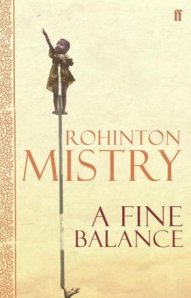One more book finished! Before taking on this challenge, I had never heard of Rohinton Mistry or this book. A Fine Balance takes place in India, primarily during the “Emergency” finagled by Prime Minister Indira Ghandi to keep herself in power (fascinating history — learn more about it here). Mistry tells the story of four characters whose lives end up woven together in unexpected ways. Each character suffers greatly; but each grows in relationship with the others.
This book is full of tragedy: whole families killed because of class hatred, marital happiness destroyed in a traffic accident, family lines cut off by brutally enforced “family planning,” injustice and violence, religious hatred, etc. And yet, to Mistry, I think the key theme is best expressed in the words of a philosophical lawyer we meet near the end of the book: ” ‘There is always hope–hope enough to balance our despair. Or we would be lost.’ ” (Kindle location 10565)
Reading this book, I felt constantly on the edge between hope and despair, usually tilting toward despair. The world of A Fine Balance is cruel, filled with loss (“Losing, and losing again, is the very basis of the life process, till all we are left with is the bare essence of human existence,” Kindle Locations 10610-10611), undirected and senseless at times (“Where was God, the Bloody Fool? Did He have no notion of fair and unfair? Couldn’t he read a simple balance sheet?” Kindle location 11145), and yet, potentially beautiful, like a pieced-together quilt (” ‘Calling one piece sad [because of the memory behind it] is meaningless. See, it is connected to a happy piece… So that’s the rule to remember, the whole quilt is more important than any single square.’ ” Kindle locations 9184-9187).
This is not a novel with a “happy ending,” and certainly not a world in which I’d ever want to live. And yet, I’m not sure this story could be called a tragedy either. Some characters are destroyed by the suffering they experience, others adapt and survive — it all depends on their ability to balance as they walk the thin line between hope and despair. “A fine balance” indeed.








 This book has gotten a lot of press recently, and for good reason — it’s a thought-provoking and compelling story that raises many ethical questions that pertain to us all. I enjoyed the chance to learn some things about science through story. If you haven’t read it yet, check it out.
This book has gotten a lot of press recently, and for good reason — it’s a thought-provoking and compelling story that raises many ethical questions that pertain to us all. I enjoyed the chance to learn some things about science through story. If you haven’t read it yet, check it out.